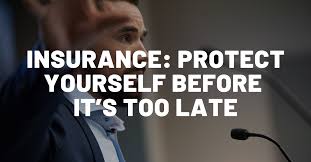
What Your Insurance Won’t Cover—Until It’s Too Late
You probably think you’re protected. You pay your premiums, renew on time, and skim the policy documents (when you have the patience). So it’s only natural to assume that when disaster strikes, your insurance will step in.
But here’s the truth: some of the most expensive risks you face aren’t covered at all—or not until it’s already too late to fix it.
From natural disasters to cybercrime, here’s a look at the sneaky coverage gaps most policyholders don’t see coming—until the bill lands in their lap.
1. Flood Damage
Standard homeowners insurance does NOT cover flooding.
Whether it’s a hurricane, heavy rainfall, or rising groundwater, if your home is underwater, you’re likely footing the repair bill yourself—unless you’ve purchased a separate flood insurance policy.
💡 Even homes outside of high-risk zones can flood. In fact, over 25% of flood insurance claims come from low- to moderate-risk areas.
2. Earthquakes
Another major disaster not covered by default in most standard policies. Earthquake coverage must be added on separately, and it often includes high deductibles and limited protections.
Live in California, the Pacific Northwest, or even parts of the Midwest? Skipping this could cost you hundreds of thousands.
3. Sewer Backup
Think your basic homeowners insurance covers it if sewage floods your basement? Think again.
Sewer or drain backup is typically excluded unless you’ve added a specific rider (usually around $50 a year). Without it, cleanup and repair costs—often upwards of $10,000—come out of pocket.
4. Mold Damage
Mold caused by a covered event (like a burst pipe)? Maybe.
Mold from ongoing leaks, humidity, or neglect? Most policies deny coverage.
The problem is, by the time mold is visible, the damage is already severe—and remediation can cost thousands.
5. Cyber Theft & Identity Fraud
As digital threats rise, so does the financial impact of cybercrime. Yet, most home and auto policies don’t include identity theft or cyber protection unless you request it.
Some insurers now offer affordable cyber liability riders to help cover:
-
Stolen funds
-
Ransomware attacks
-
Legal fees
-
Identity restoration
6. Maintenance-Related Issues
Insurance is for sudden, accidental losses—not wear and tear. That means:
-
Roof leaks from aging shingles
-
HVAC breakdowns
-
Termite damage
-
Foundation cracks from shifting soil
All of these are likely excluded. The insurer may even deny a claim if they determine you failed to properly maintain your property.
7. Business Use of Your Home or Car
Do you run a side hustle from home? Drive for Uber or deliver with Instacart?
Standard homeowners or auto policies usually exclude commercial use. If you don’t add the proper endorsement or business policy, a claim related to your work activity could be denied—leaving you exposed.
8. Luxury Items and High-Value Collections
Think your $10,000 engagement ring or rare art collection is fully insured? Not likely.
Most homeowners policies cap jewelry, art, and electronics coverage—often between $1,000 and $2,500 total—unless you schedule these items separately.
9. Acts of War or Nuclear Incidents
It’s rare, but worth noting: virtually all policies exclude war, terrorism, and nuclear damage. If a large-scale event of this nature occurs, your insurance may offer zero protection.
10. Gaps Between Auto Liability and Lawsuits
Your auto policy might include $100,000 in liability. But if you cause a serious accident and are sued for $500,000?
You’re personally responsible for the rest.
This is why umbrella insurance exists—but many people never add it.
So, What Can You Do?
Insurance shouldn’t be a guessing game. Here’s how to avoid the “too late” moment:
✅ Read your policy carefully—or better yet, ask your agent to walk you through exclusions
✅ Add riders or endorsements for common exclusions like sewer backup, valuables, or identity theft
✅ Consider separate policies for flood, earthquake, or business coverage
✅ Keep records and maintain your property to avoid claims being denied for neglect
✅ Ask your insurer about umbrella coverage to fill high-liability gaps
Final Thought
Insurance is only helpful when it works how you expect it to. Unfortunately, many people find out what isn’t covered only after a crisis hits—and by then, the damage is already done.
Don’t let a false sense of security leave you financially exposed.
The time to find out what your insurance doesn’t cover is before—not after—you need it.
